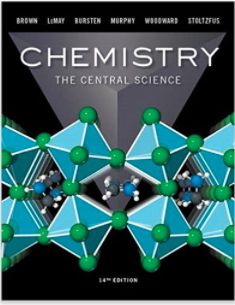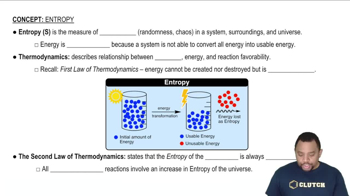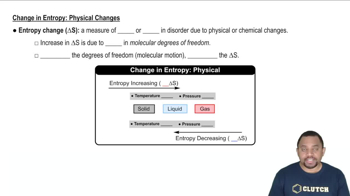Indicate whether each statement is true or false. (a) Unlike enthalpy, where we can only ever know changes in H, we can know absolute values of S. (b) If you heat a gas such as CO2, you will increase its degrees of translational, rotational and vibrational motions. (c) CO2(g) and Ar(g) have nearly the same molar mass. At a given temperature, they will have the same number of microstates.
Ch.19 - Chemical Thermodynamics

Brown14th EditionChemistry: The Central ScienceISBN: 9780134414232Not the one you use?Change textbook
Chapter 19, Problem 39
For each of the following pairs, predict which substance has the higher entropy per mole at a given temperature: (a) Ar(l) or Ar(g) (b) He(g) at 3 atm pressure or He(g) at 1.5 atm pressure (c) 1 mol of Ne(g) in 15.0 L or 1 mol of Ne(g) in 1.50 L (d) CO2(g) or CO2(s)
 Verified step by step guidance
Verified step by step guidance1
Step 1: Understand the concept of entropy. Entropy is a measure of the disorder or randomness in a system. Generally, the more disordered a system is, the higher its entropy.
Step 2: Analyze part (a). Compare Ar(l) and Ar(g). Gases have higher entropy than liquids because gas molecules are more disordered and have more freedom of movement.
Step 3: Analyze part (b). Compare He(g) at 3 atm and He(g) at 1.5 atm. At lower pressure, gas molecules have more space to move around, leading to higher entropy.
Step 4: Analyze part (c). Compare 1 mol of Ne(g) in 15.0 L and 1 mol of Ne(g) in 1.50 L. A larger volume allows gas molecules more space to move, increasing entropy.
Step 5: Analyze part (d). Compare CO2(g) and CO2(s). Gases have higher entropy than solids because gas molecules are more disordered and have more freedom of movement.
Key Concepts
Here are the essential concepts you must grasp in order to answer the question correctly.
Entropy
Entropy is a measure of the disorder or randomness in a system. It quantifies the number of possible microstates that correspond to a given macrostate, with higher entropy indicating greater disorder. In general, gases have higher entropy than liquids or solids due to their increased freedom of movement and greater number of accessible microstates.
Recommended video:
Guided course

Entropy in Thermodynamics
Effect of Pressure on Gas Entropy
The entropy of a gas is influenced by its pressure. At higher pressures, gas molecules are compressed, leading to fewer available microstates and thus lower entropy. Conversely, at lower pressures, gas molecules have more space to move, resulting in higher entropy. This concept is crucial when comparing gases at different pressures.
Recommended video:
Guided course

Entropy and Physical Changes
Volume and Entropy in Gases
The volume occupied by a gas also affects its entropy. A larger volume allows gas molecules to occupy more positions and states, increasing the system's entropy. Therefore, when comparing the same amount of gas in different volumes, the gas in the larger volume will have higher entropy due to the greater number of accessible microstates.
Recommended video:
Guided course

Entropy in Thermodynamics
Related Practice
Textbook Question
Textbook Question
For each of the following pairs, predict which substance possesses the larger entropy per mole: (a) 1 mol of O2(g) at 300 °C, 0.01 atm, or 1 mol of O3(g) at 300 °C, 0.01 atm
Textbook Question
Predict the sign of the entropy change of the system for each of the following reactions: (a) N2(g) + 3 H2(g) → 2 NH3(g)
Textbook Question
Predict the sign of the entropy change of the system for each of the following reactions: (b) CaCO3(s) → CaO(s) + CO2(g)
